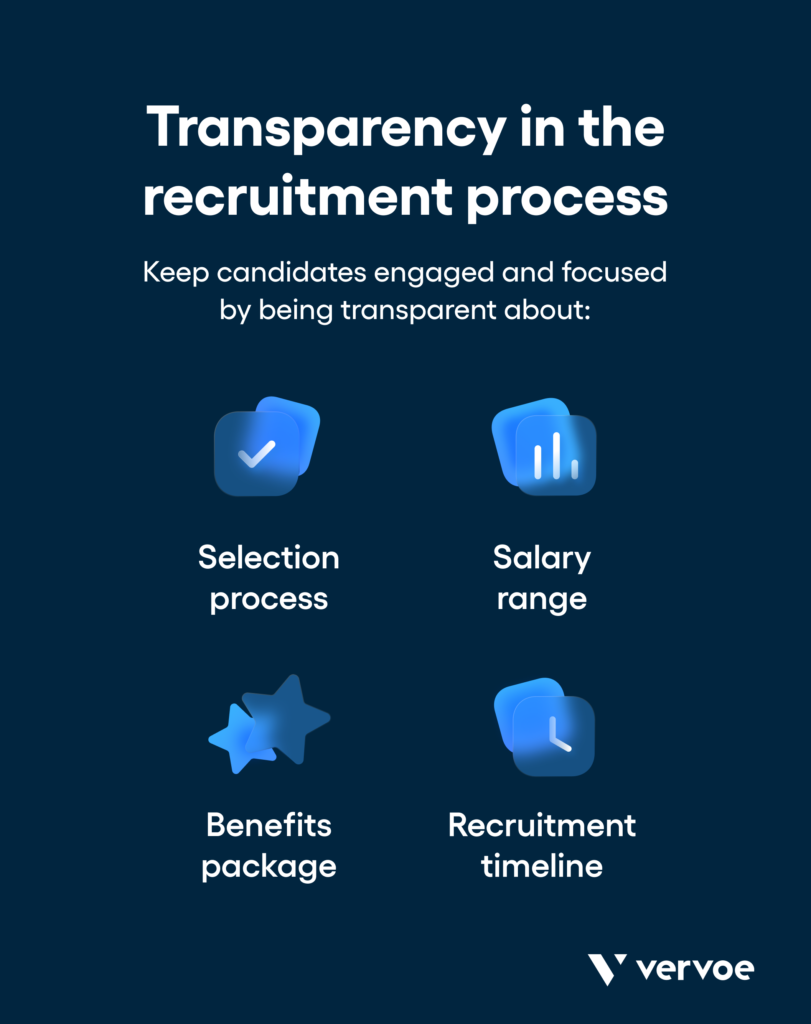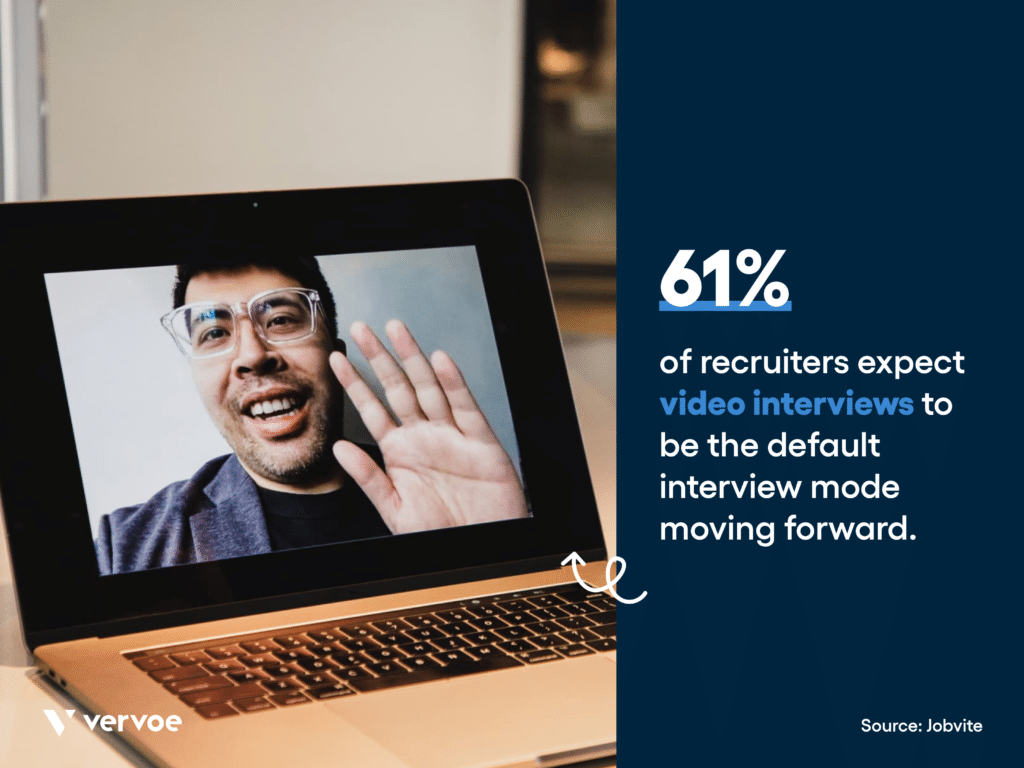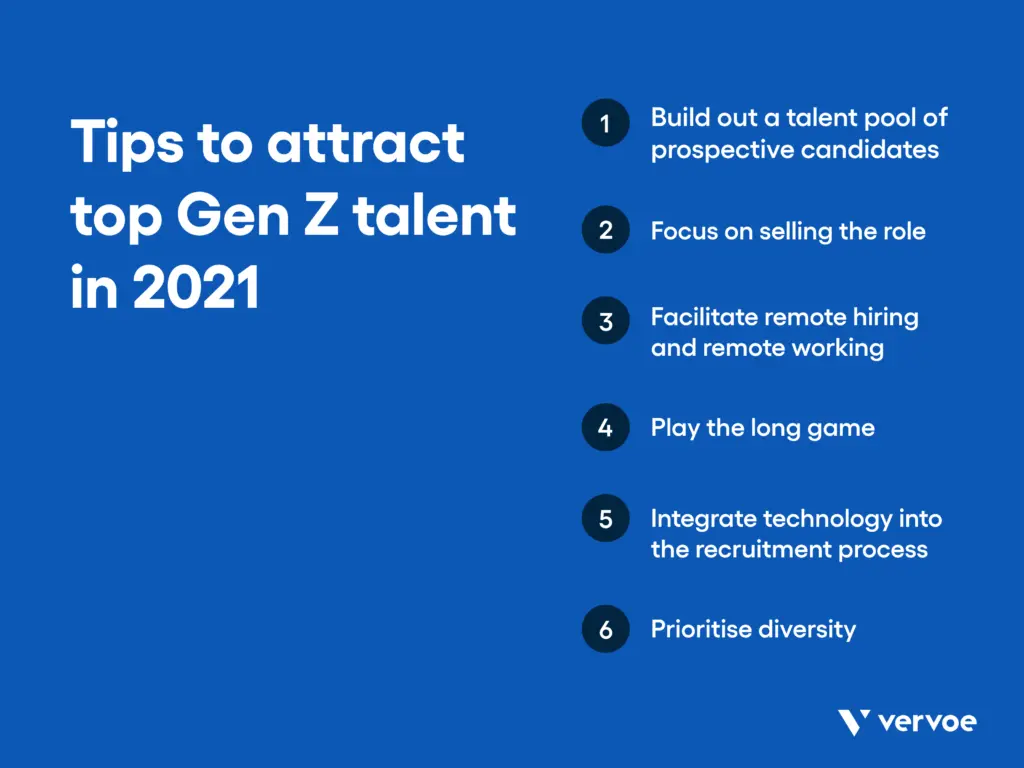In 2020, disruptions caused by the COVID-19 pandemic forced the recruitment industry to adapt at a rapid pace to:
- High unemployment rates – the U.S. Bureau of Labor Statistics reported that the U.S. unemployment rate reached an all-time high of 14.7% in April 2020; a higher percentage than during The Great Depression in the 1930s.
- The shift to remote working – According to Gallup, U.S. remote work days doubled during the pandemic.
- The adoption of remote recruitment methods – A Gartner poll of HR leaders in April 2020 found that 86% of organizations are incorporating virtual technology to interview candidates in response to uncertainty created by the pandemic.
These unprecedented circumstances will accelerate existing recruitment trends and inform new ones in the coming months. This article outlines 25 key recruiting trends to be aware of in 2021 to attract, recruit, and retain top talent.
Employee retention
Recruitment industry trends are very often driven by the goal of reducing employee turnover rates. Here are some of the key ways recruiters and hiring managers will contribute to improving employee retention in 2021.
1. Retention-focussed hiring
According to Gallup, the cost of replacing a single employee can range from one-half to two times the employee’s annual salary. As such, limiting turnover rates should be a top priority for recruiters in 2021. This can be achieved via thorough interview processes, assessing growth potential and candidates’ loyalty, and robust diversity and inclusion programs. One Deloitte survey, for example, found that 23% of employees left their job for a workplace with a more inclusive culture.
2. Increased internal mobility
Post COVID-19, employees might be more reluctant to abandon their current employer, opting for job security over new opportunities. LinkedIn reports that since the outbreak of the pandemic, internal mobility has increased by nearly 20%.

This shift in employee mindset ultimately means it will be more important to identify high-potential candidates with transferable and future-proof soft skills.
Embracing internal mobility holds several benefits; the recruitment process will be cheaper and quicker, and retention rates can improve as employees are motivated to stick around for internal opportunities.
3. More remote hiring
A large proportion of the workforce grew accustomed to flexible working in 2020, and that’s not a freedom many employees will willingly surrender. Be aware that the option to work remotely, at least some of the time, will be a key incentive for many people – driving loyalty to the organisation and improving employee wellbeing.
Many employers are ramping up their remote hiring. The good news is that flexible working is a proven way to increase employee retention, loyalty, and happiness.
4. Workplace flexibility
Not only do employees value the opportunity to share feedback on their experience of the recruitment process, but they want the option to negotiate on contractual terms. Retention rates improve among candidates who were given the chance to negotiate on benefits, flexibility, and career progression.
Interview and assessment
Driving efficiency throughout the end-to-end recruitment cycle will be another key focus for the industry this year.
5. Diversity-focussed hiring
Diversity hiring seeks to ensure that candidates are not discriminated against based on their age, race, gender, sexuality, religion, or any other characteristics that have no bearing on their ability to perform a role.
At present, almost 50% of talent professionals claim that hiring managers are not being held accountable for interviewing a diverse range of candidates. In 2021, recruiters and hiring managers will commit to eliminating their unconscious bias and prioritising diversity and inclusion initiatives. A good starting point for this would be to establish diverse interview panels that accurately reflect your talent pool.
6. Transparency in the recruitment process
Transparency throughout the recruitment process helps to keep candidates engaged and focused. This includes being open about:
- Selection process – Clearly communicating how the recruitment process works is really important. For example, how many interview stages will there be and will AI or automation be used to filter candidates?
- Salary range – Being upfront about salary saves time in the long run by helping recruiters to quickly filter out under or over-qualified candidates.
- Benefits package – It’s not worth falsely promising a candidate speedy career progression, additional holiday days, or flexible working. These sorts of empty promises will only serve to increase turnover rates.
- Recruitment timeline – This information is particularly important for candidates who are currently out of work. A lengthy recruitment process might well be off-putting for them, but they have the right to know what they’re getting themselves in for.

When you pay candidates the respect of being open and honest, you’re more likely to receive the same honesty in return.
7. More interview feedback
No one enjoys the process of rejecting applicants, but the industry is becoming increasingly aware of how important it is to provide constructive interview feedback to both successful and unsuccessful candidates.
Doing so is a mark of respect that not only gives candidates the closure they need but protects your brand’s reputation. If a candidate feels they have been treated unfairly, they’re likely to spread the word.
Research shows that the recruitment process is what drives 97% of candidates to refer others, while more than 50% of candidates will share the details of their recruitment experience via social media.
Failing to provide a positive experience for applicants can wind up being pretty costly for your organisation. In 2017, for example, Virgin Media calculated that bad candidate experience was costing them as much as $5.4 million a year.
8. Candidate relationship management
Today, 90% of HR professionals believe that talent acquisition trends are largely driven by the candidate. As a result, candidate relationship management (CRM) looks set to be a top recruitment trend in 2021. CRM is the process of establishing and maintaining strong and meaningful relationships with past, current, and potential candidates. In doing so, you’ll build out your talent pool, which can be used as and when new positions open up.
This year will see increased adoption of CRM software to help you to nurture the talent pipeline and drive better candidate engagement throughout the recruitment process.
9. Fairer recruitment processes
As diversity and inclusion continues to be a top priority for employers in 2021, recruiters will look to establish fairer and more consistent recruitment processes. In 2021 we’ll see fairer recruitment processes including:
- Providing leadership teams and managers with interview training – Recruiters and hiring managers should also develop a standardised candidate evaluation template to help employers successfully evaluate applicants.
- Including several people in the recruitment process – A single recruiter or hiring manager shouldn’t be doing all the decision-making and all interview panels should comprise diverse employees.
- Setting clear goals and expectations for each open position.
- Setting interview questions for each position so all candidates are assessed fairly.
- Maintain regular contact with candidates between recruitment stages and during the decision-making process.
- Screening candidates with consistent skills tests.
10. Increased skill testing
One of the biggest recruitment trends in 2021 will be driving efficiency. Evidence is mounting that skills testing works much more effectively than other traditional hiring methods with 64% of experts claiming that this is a vital practice to establish faster candidate screening.
When candidates are assessed and recruited based on their intrinsic talent, rather than background or former experience, they are more likely to perform highly. In addition, skills testing contributes to removing unconscious bias from the recruitment process, resulting in happier, longer-term hires.
Technology
Recruiting trends and talent tech will go hand and hand in 2021, with a focus on the following factors.
11. Virtual recruitment technology
The global pandemic prompted an unavoidable uptick in virtual hiring, with many organisations establishing an end-to-end virtual recruiting process for the first time.
However, this is a trend that will continue throughout 2021 with 61% of recruiters expecting video interviews to be the default interview mode moving forward – particularly for entry-level candidates.

Video interviewing, in particular, provides several benefits. Firstly, the ability to record the interview negates the need for the interviewer to note-take. Secondly, the process is much more efficient because candidates are more able to find time in their day to attend a virtual interview. Finally, it’s much easier to fairly compare candidates when you can simply playback answers to specific interview questions.
The biggest challenge for recruiters and hiring managers won’t be the implementation of technology itself, but ensuring they can maintain human connection throughout a virtual recruitment process.
12. Strategic talent insights
Using strategic talent insights is the process of drawing on available talent data to enable strategic workforce planning and ultimately build and retain a strong workforce.
In 2021, business leaders will look to you to provide valuable insights on talent pools, company culture, and potential skills gaps.
Recruiters will increasingly leverage talent insights tools, which offer access to vast data sets to reveal key recruitment trends and enable strategic decision-making. LinkedIn’s Talent Insights, for example, gives organisations access to its global database of professionals.
13. AI and automation
The adoption of AI Recruitment and automation in the recruitment industry has been on the rise for some time, and this will continue in 2021.
Recruiters and hiring managers have historically spent a lot of time performing manual or repetitive tasks. Filtering through large volumes of candidate applications, for example, is often cited as a major pain point for the profession. Intelligent recruitment tools can take on many of these tedious tasks including:
- Candidate screening using machine learning or predictive algorithms
- Creating job descriptions
- Applicant tracking systems
- Interview scheduling
- Candidate communication such as automated emails and chatbots
- New-hire monitoring
- On-boarding programs
Alongside supporting recruiters and hiring managers, these technologies can significantly cut hiring costs and streamline the recruitment process. The screening and shortlisting of applicants can take up to 23 hours of a recruiter’s time for a single hire, whereas an AI tool can instantly process thousands of applications.
14. Candidate data security
Since the outbreak of COVID-19, the FBI reported a 300% increase in reported cybercrimes.
The rise of remote work and COVID-19-related scams are largely responsible for this dramatic surge in cyberattacks.
With remote working here to stay for the foreseeable future, the recruitment industry will be taking data protection extremely seriously in 2021. Failure to do so could have a devastating impact, impacting your brand’s reputation and destroying customer and employee trust.
15. Recruitment data analytics
Leveraging data-driven insights will be a top priority for recruiters in 2021. Data analytics tools and applicant tracking software (ATS) will enable recruiters and hiring managers to develop effective hiring plans and shift towards data-driven decision-making.
The evolving role of the recruiter
The role of the recruiter is constantly evolving, but perhaps never quite so rapidly as in the year following a global pandemic.
16. Upskilling recruiters
In 2021, the shift to remote work, increased unemployment, evolving business priorities, and a rise in internal hiring will transform the role of the recruiter.
LinkedIn reports that the most in-demand skills for recruiters in 2021 are adaptability, personal development, and diversity and inclusion. As well as catering to your organisation’s hiring needs, more time will be spent developing important initiatives and working on HR strategy.
Honing technical skills such as virtual recruitment and onboarding will also be a priority in the coming months.
17. Recruiters become trusted business advisors
The shift to remote working might provide many benefits for both employer and employee, but it also raises several important questions. For example, how will your organisation fairly compensate a widely distributed workforce, drive a positive company culture, and leverage technology?
Business leaders will depend heavily on recruiters to share data-driven insights and assist with workforce planning.
Attracting top talent
Talent acquisition trends 2021 are as follows:
18. Companies embracing remote work
Organizations spent most of 2020 adapting to the sudden changes brought about by COVID-19. But in 2021, recruiters and hiring managers will be better equipped to benefit from them.
Gartner reported that 90% of HR managers will continue to allow some form of remote work after the pandemic is over. This means candidates can be sourced from anywhere, providing access to much larger talent pools.
Flexible working also offers significant cost savings, improves retention, and makes it easier to embrace the gig economy. As pandemic-related disruptions continue into 2021, some organisations will be reluctant to expand their permanent workforce. Instead, recruiters will transition from job description-based hiring to project-based hiring.
19. Online employer branding
In these turbulent times, employer branding will play a crucial role for organisations looking to attract top talent.
In the past year, the government’s handling of the pandemic, George Floyd’s murder and the subsequent rise of the Black Lives Matter movement, the U.S. election, and the Capitol building riots have served to further polarise parts of society.
In 2021, candidates will look to work for organisations that take a clear stance on key social issues, which means recruiters will focus more closely on employer branding. There will be a notable shift from recruiters selling an organisation’s benefits program or office amenities, to talking about how the company is supporting its diverse employees and the initiatives they back. Organisations with solid employee branding receive 50% more qualified applicants.
20. Building an agile workforce
Organisations have recently been favouring the contingent workforce model, which sees the hiring of low-to-medium-skill workers on a temporary basis to fill a specific role or work on a specific project.
But in 2021, recruiters will focus on developing agile workforces. In this scenario, highly-skilled, specialist workers are recruited to offer their expertise, innovative solutions, and alternate perspectives. These employees would be expensive to hire on a full-time basis but are increasingly crucial to your organisation’s success.
It is also possible for an organisation to build agility internally with its existing workforce. This can be achieved by pushing employees out of their comfort zones, committing to cross-functional internal recruitment, and fostering a culture of innovation, creativity, and experimentation.
21. Diversity and inclusion in the workplace
It’s no secret that the best workforces are diverse workforces. But employees are more likely than ever before to accept or reject job offers based on an employer’s diversity and inclusion (D&I) efforts. One-third of recruiters say more applicants are asking questions about D&I efforts than they did in the previous year.
As such, diversity hiring will become a priority this year. Recruiters and hiring managers will need to work closely with HR and the business at large to ensure their efforts to attract, recruit and retain diverse employees align with the internal workplace culture.
22. Digital recruitment marketing
Recruitment marketing is the process of taking the employer’s mission statement and key branding and effectively communicating it to attract prospective candidates.
In 2021, recruiters will increasingly leverage digital recruitment marketing solutions to connect with applicants via social media and other channels.
23. Returning to the office
We know that organisations will continue to embrace remote working, but that doesn’t mean saying goodbye to the workplace altogether. Many employees really miss the human connections and interactions that come with office life, and look forward to returning to some kind of normalcy in 2021. You’ll need to consider this fact and look for ways to accommodate the needs of different candidates.
24. Hiring for soft skills
McKinsey predicts that in ten years from now demand for soft skills will rise across all industries, including by 26% in the United States.
In 2021, recruiters will focus on attracting candidates with cross-functional skills and, in particular, those much-valued soft skills. Post-pandemic skills including emotional intelligence (EQ), communication, adaptability, and creativity will be in high demand.
25. Hiring Generation Z
A member of Gen Z is anyone born between 1997 and 2012. Although this generation has been slowly trickling into the workforce for a few years now, Forbes reports that the disruption of the past year has significantly shifted their perspective on work.
In 2021 recruiters and hiring managers will need to rethink their strategy for attracting Gen Z talent. Unlike millennials, who have long dealt with the reputation of being “job hoppers”, Gen Z are more likely to prioritise financial stability and job security.
To attract top Gen Z talent in 2021, recruiters will need to:
- Build out a talent pool of prospective candidates.
- Focus on selling the role.
- Facilitate remote hiring and remote working.
- Play the long game – according to Forbes, more than one in three Gen-Zers plan to stay at their first job for more than four years, which means it’s important to plot out an exciting career trajectory.
- Integrate technology into the recruitment process.
- Prioritize diversity – Gen Z is the most diverse generation yet and they care a lot about diversity in the workplace.





















